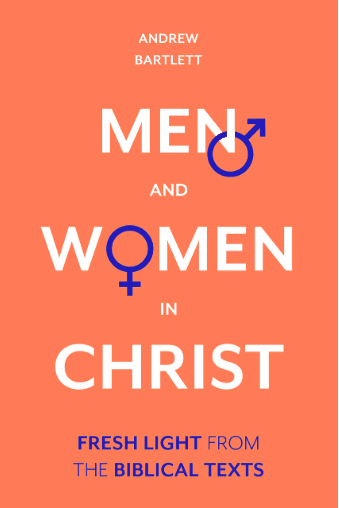 This begins a series on a book by one skilled in adjudication, Andrew Bartlett. He examines, in his new book Men and Women in Christ (MWiC), the relation between men and women in home and church on the basis of the Bible by adjudicating between competing claims.
This begins a series on a book by one skilled in adjudication, Andrew Bartlett. He examines, in his new book Men and Women in Christ (MWiC), the relation between men and women in home and church on the basis of the Bible by adjudicating between competing claims.
One more time, the issue at hand:
Bible-based Christianity is threatened with a needless schism.
Some complementarians say that their rivals are disobeying God’s design, undermining both family and society, and giving encouragement to sexual confusion and immorality. Some egalitarians say that complementarians are opposing God’s purposes, damaging Christian witness, and pouring fuel on the fires of domestic abuse, pornography and the denigration of women.
These far-reaching claims may seem out of proportion with the actual points of divergence. The debate is over the place of men and women in marriage and . church leadership, as portrayed in the Bible. Complementarians say that men must be leaders of their wives and that church roles involving authoritative teaching are reserved for men. Egalitarians disagree on both points. The purpose of this book is to encourage progress towards reducing and resolving these disagreements.
He’s right on this one: “The loudest voices have been raised in the USA.” His books utilizes to the max the work of two representative scholars: Wayne Grudem and Phil Payne.
The discussion reached a turning point in 1986, after the winter meeting of the Evangelical Theological Society. Since that time the division has become more firmly entrenched. The Council on Biblical Manhood and Womanhood (CBMW) was set up in 1987 to promote the complementarian teachings of what became known as the Danvers Statement (because it was adopted in Danvers, Massachusetts). The CBMW soon published a book called Recovering Biblical Manhood and Womanhood: A Response to Evangelical Feminism (RBMW). In 1988 Christians for Biblical Equality (CBE) was begun (based in Minneapolis), in opposition to what it called ‘the shallow biblical premise used by churches, organizations, and mission groups to exclude the gifts of women’. It adopted its own, firmly egalitarian, statement in 1989.
A process of polarization has ensued. Organizations which had previously allowed liberty of opinion started drawing red lines. For example, the Southern Baptist Convention, which had previously allowed women pastors, revised its statement of faith in 2000 to add the words ‘While both men and women are gifted for service in the church, the office of pastor is limited to men as qualified by Scripture.’ When The Gospel Coalition was set up in 2005, it included an explicitly complementarian position in its Confessional Statement. In 2012 a team leader in a campus ministry refused to allow female staff to teach Bible studies to mixed-gender audiences, and was demoted as a result.
Bartlett’s point is that the NT teaches unity and that, while it is appropriate to divide over essentials, it is not appropriate to divide over non-essentials. (These are my terms but it seems he agrees.)
- Christian unity is being damaged by a polarizing schism between egalitarians and complementarians.
- The traditional interpretation of the Bible, to the effect that women are innately inferior to men, has rightly been rejected as being based more on patriarchal culture than on the actual text. Both egalitarians and complementarians now regard women and men as inherently equal and now affirm that women may be leaders in wider society. But complementarians insist on male leadership in the church and in marriage.
- Faithful interpretation of the Bible gives Scripture priority over tradition, pays attention to culture, goes back to the source language in context, looks for coherence and takes a Christ-centred canonical approach; and it does this with spiritual openness and practical wisdom (appendix i).
- Applying those methods will lead to the conclusions of this book, which will be that the complementarian and egalitarian positions are each partly correct and partly mistaken.
- If Christian believers can move closer together on these issues, this will please the Lord and strengthen the church’s service as salt and light in a confused and hurting world.











